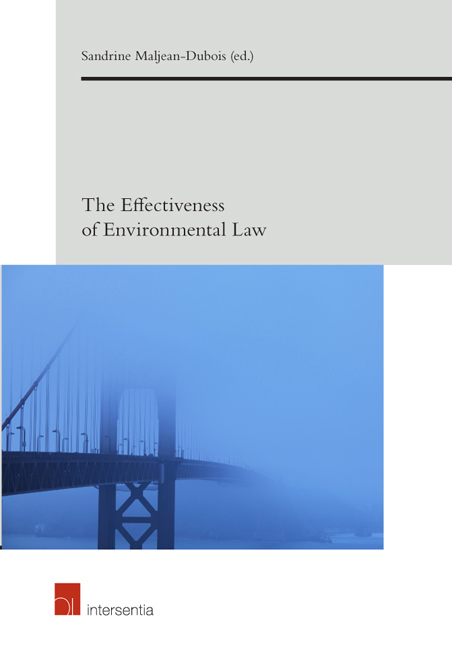Book contents
- Frontmatter
- Preface
- Contents
- Introduction. The Effectiveness of Environmental Law: A Key Topic
- Part 1 Measuring and Assessing Effectiveness
- Part 2 Improving Effectiveness
- Better Legislation
- Chapter 2 The Effectiveness of Payment for Ecosystem Services: a mix between a gradient model of public intervention and an effective normative framework
- Chapter 3 The Effectiveness of Environmental Law through Contracts
- Chapter 4 Legal Weaknesses and Windows of Opportunity in Transnational Biodiversity Protection: as Seen through the Lens of an Ecosystem Approach-Based Paradigm
- Chapter 5 Better Expertise through Institutional Linkages. The Case of the Mediterranean Basin
- Chapter 6 Environmental Dignity Rights
- Chapter 7 The Environmental Protection of Traditional Knowledge and the Active Participation of Indigenous Peoples in the Planning, Management and Decision-Making Processes as Means of Improving the Effectiveness of Environmental Law
- Chapter 8 Promoting Electricity from Renewable Energy Sources in France. Is French Law Appropriate for Achieving the Objectives?
- Chapter 9 Changing Patterns of International Environmental Law-Making: Addressing Normative Ineffectiveness
- Chapter 10 The Effectiveness of EU Nature Legislation: a long battle to secure supporting sectoral policies
- Better Implementation
Chapter 2 - The Effectiveness of Payment for Ecosystem Services: a mix between a gradient model of public intervention and an effective normative framework
from Better Legislation
Published online by Cambridge University Press: 27 September 2018
- Frontmatter
- Preface
- Contents
- Introduction. The Effectiveness of Environmental Law: A Key Topic
- Part 1 Measuring and Assessing Effectiveness
- Part 2 Improving Effectiveness
- Better Legislation
- Chapter 2 The Effectiveness of Payment for Ecosystem Services: a mix between a gradient model of public intervention and an effective normative framework
- Chapter 3 The Effectiveness of Environmental Law through Contracts
- Chapter 4 Legal Weaknesses and Windows of Opportunity in Transnational Biodiversity Protection: as Seen through the Lens of an Ecosystem Approach-Based Paradigm
- Chapter 5 Better Expertise through Institutional Linkages. The Case of the Mediterranean Basin
- Chapter 6 Environmental Dignity Rights
- Chapter 7 The Environmental Protection of Traditional Knowledge and the Active Participation of Indigenous Peoples in the Planning, Management and Decision-Making Processes as Means of Improving the Effectiveness of Environmental Law
- Chapter 8 Promoting Electricity from Renewable Energy Sources in France. Is French Law Appropriate for Achieving the Objectives?
- Chapter 9 Changing Patterns of International Environmental Law-Making: Addressing Normative Ineffectiveness
- Chapter 10 The Effectiveness of EU Nature Legislation: a long battle to secure supporting sectoral policies
- Better Implementation
Summary
ABSTRACT
This contribution suggests that the binary distinction between purely “public” and “private” PES is not relevant from a legal point of view. A gradient model of public intervention seems more accurate, from private PES mostly, in which the whole process is voluntary and mainly governed by private contracts between the beneficiary and producers, to mainly public-driven PES, based on subsidies paid for predefined sustainable farming practices. Within this gradient, three factors may influence the performance of the instrument and ensure its effectiveness, efficacy or efficiency: actors, knowledge and monitoring. Another correlation with the success of PES seems to lie in the intensity and the quality of the mechanism's normative framework, whatever the public or private nature of the regulation. This should take three kinds of factors into account: ecological concerns, social concerns and economical concerns.
INTRODUCTION
This contribution will present the results of a legal study made for a European collective project called “Invaluable”. This study deals with the question of the place of Law in market-based instruments (MBI), in Payments for Ecosystem Services (PES) specifically.
Ecosystem services were presented in 1997 by Gretchen Daily as “the conditions and processes through which natural ecosystems and species that build support and enable human life”. A simplified definition, subject to a relative consensus, was proposed in the 2005 Millennium Ecosystem Assessment (MEA): services here refer to “benefits provided by ecosystems to human well-being”. These benefits can be goods (food, wood, vegetable fats …) but also services (air purification, pollination …). Their preservation refers to the expression of societal needs that can be associated with basic needs (food, the need to breathe …), energy, or welfare or cultural identity (tradition …). In order to maintain these services, Market-based instruments were then developed outside of the law. Some of them are called Payments for Environmental Services (PES).
PES has not received a standard definition, but globally they consist in remunerating someone for the continuation or the implementation of a virtuous practice with regards to biodiversity and ecosystem services. They tend to be considered in terms of market-based instruments in the economic literature. If we analyse PES through a legal approach, we should introduce the notion of “agreement”.
Information
- Type
- Chapter
- Information
- The Effectiveness of Environmental Law , pp. 41 - 66Publisher: IntersentiaPrint publication year: 2017
